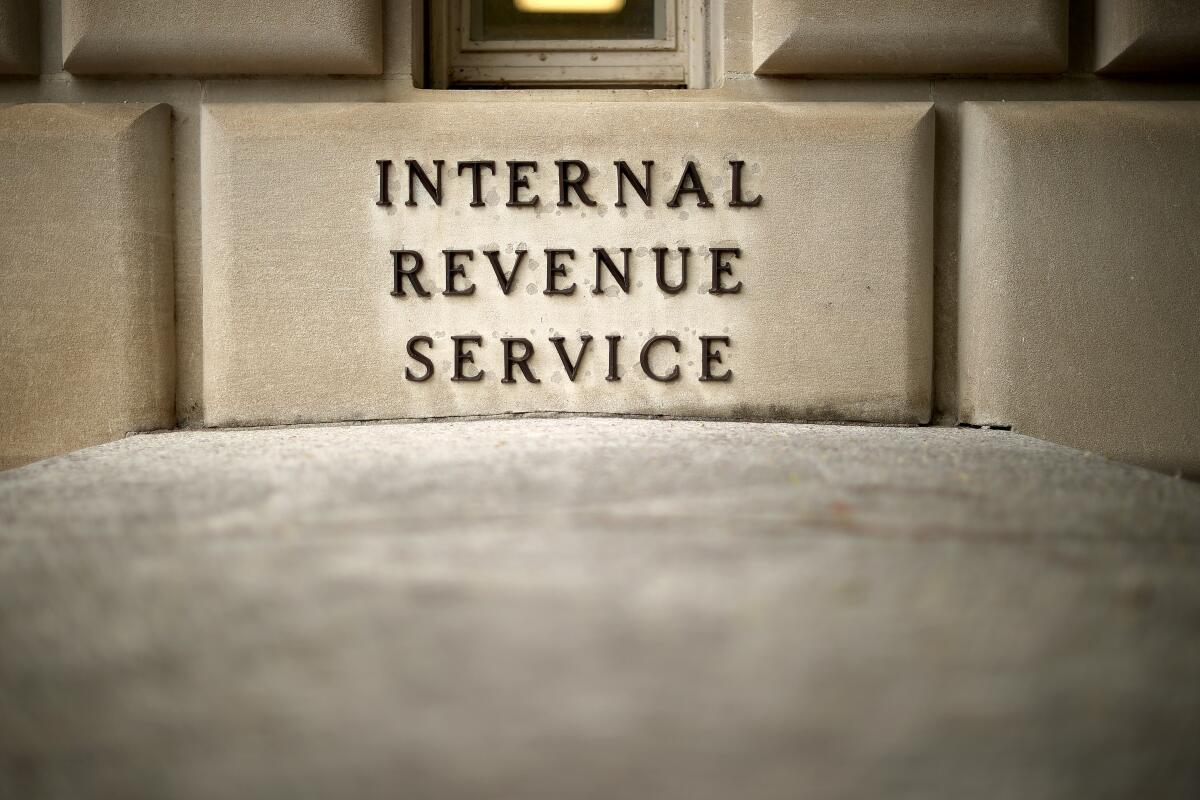IRS apologizes for telling taxpayers their debt was due in weeks rather than months

- Share via
The phones of tax specialists all over California were ringing off the hook this week.
There were five on Tuesday — and five the next day — at the office of certified public accountant Tyler Ashmore in Bakersfield. Also on Tuesday, 15 customers rang the business line and personal cell of Dan Herron, a tax preparer in San Luis Obispo. The same day about a dozen calls and emails hit the inboxes of David R. Flamer, a CPA in Agoura Hills.
An untold number of California taxpayers — believed to be in the hundreds of thousands — were recently mailed notices from the Internal Revenue Service notifying them that the income tax they owed was due within three weeks rather than the roughly four months the agency previously promised. The agency sent out a digital notice to those taxpayers this week, apologizing for its mistake and confusion.
“The IRS reassures California taxpayers that they continue to have an automatic extension until later this year to file and pay their taxes for those covered by disaster declarations in the state,” the agency noted in a statement Wednesday.
Notices, called a CP14, are for “taxpayers who have a balance due, and they are sent out as a legal requirement,” according to the IRS.
The agency did not respond to calls or an email from a Times reporter for further comment.
For the record:
10:54 a.m. June 12, 2023A previous version of this story said the tax extension in areas affected by “severe winter storms, flooding and mudslides” applied to 51 counties. It applied to 55 counties.
The IRS granted individual and business tax payment extensions in January to those in areas affected by “severe winter storms, flooding and mudslides in California” last year. The extension applied to 55 counties, including Los Angeles, Orange, Riverside, San Bernardino, Santa Barbara and Ventura.
Due dates were changed from May 15 to Oct. 16.
The CP14s received this week, however, listed payment due dates within 21 days. That meant those expecting to pay off their debt erroneously saw their timetable cut from four months to late June.
“The hardest part for tax professionals is the work that is not of our doing,” said Ashmore, who added that he spent 20 to 30 minutes explaining to each client what was taking place. “Part of my job is easing their fears, which if you work with the IRS is par for the course.”
The CP14 notice can range from a few to several pages with a first page including a statement balance and due date. The IRS noted that all letters sent out included a “special insert” that noted the payment date listed “does not apply to those covered by a disaster declaration.”
That insert can easily be skipped or ignored, contended Herron, the San Luis Obispo tax preparer.
“There’s nothing on the front page that indicates that the IRS is aware that this person is impacted by flooding,” he said. “All that my clients are thinking is ‘I have to pay this bill by June,’ which could be a substantially large sum for some.”
For his part, Ashmore, the Bakersfield accountant, said his customers’ tax debts ranged from $50 to $50,000, while Herron said most of his patrons had bills in the four-figure range.
Herron said the IRS notices created a fervor on tax preparation social media, including #TaxTwitter, where CPAs lamented the governmental gaffe.
“One of the big issues with this notice is that my people don’t have two to three hours to call and wait to speak with an IRS agent when they get these notices and get scared,” said Flamer, the Agoura Hills CPA. “These unwarranted letters caused unnecessary anxiety.”
Ashmore said he was faxing a letter to the IRS on behalf of his clients to let the agency know his patrons qualify for an extension, while Flamer and Herron are telling customers to disregard the letters.
“I told my people to send me a copy of the notice and not to worry about it,” Flamer said. “They still have until Oct. 16.”
The IRS was obviously concerned with getting inundated with calls from taxpayers. In the last line of its apology sent out Wednesday, the agency recommended that “taxpayers receiving letters do not need to call the IRS or their tax professional.”
More to Read
Sign up for Essential California
The most important California stories and recommendations in your inbox every morning.
You may occasionally receive promotional content from the Los Angeles Times.











